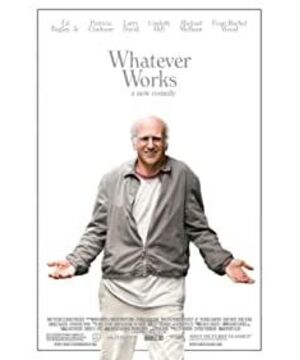Whatever Works is relatively simple and straightforward. It is a tragicomedy just like Melinda and Melinda. In the film, the protagonist Boris Yelnikoff is white-haired and self-proclaimed as genius. He talks about the lessons of Christ and Marx's theory as good, but forgets the evil nature of human nature. The darkness of reality only teaches people to yell "Horror! Horror!" Boris Embrace the world-weary and pessimistic philosophy of life, fail to commit suicide, put aside all the good on the surface, and live in a small apartment in a declining area of New York. Boris meets Melodie, a clumsy young woman from the south. The two are married. Everything is fine for a year, but the joy is gone, and the symphony of destiny descends. Melodie guards her right-wing parents and comes to the United States. The absurd marriage of Boris and Melodie brought together Melodie and the handsome actor Randy; on the other hand, Melodie's parents discovered themselves, women became artists of "two-sex threesome", and men sought homosexuality again. In the end, Boris failed to commit suicide again, but everyone reunited at the New Year's party and seemed to find a little bit of love and joy in life.
Obviously, there is no Woody Allen "European" goddess Scarlett Johansson in the film, but her shadow is scattered on the actor Randy, the stupid girl Melodie and her artist mother. Living Aaron himself did not show up, but all the cynical and cynical dialogues showed that Boris was his faithful microphone at all, and Boris knocked down Helena when he committed suicide for the second time. Helena was actually a prophetic psychic. Can't change the reality of the Princess of Troya Cassandra (Cassandra)? And I thought Cassandra's dream (2007) referred to Cassandra is not any character in the play, but Alan himself. In other words, Woody Allen sees himself through Boris. In the scene, Boris saves himself because of the appearance of Helena. Both inside and outside the scene are very narcissistic old man Woody Allen pretending to be a ghost.
In Whatever Works, Boris speaks directly from time to time, probably using the alienation effect of Bertolt Brecht to induce the audience to think rationally about life rather than empathize. But just as Randy in the movie is an actor who has performed in the tragicomedy Juno and the Peacock by Irish playwright Sean O'Casey (see Hitchcock's 1930 film version), by I appreciate Woody Allen’s use of a tragicomedy film based on the basic model of "crisis, no death" to show the essence of life-the film contains the basic elements of comedy, such as comical ordinary characters, social and political irony (for American conservative right), witty dialogues, humorous plots, absurd life experiences, but everything ironically reflects the pain and hopelessness of life, ideological crisis and marital crisis, but in the end, the pessimistic mood is due to the expression of comedy and The ending can be eased, and even make people feel happy.
The title of "Juno and the Peacock" refers to the Roman goddess of marriage, Juno. Yes, Whatever Works is also about marriage, the love and love of men and women, but the title also reminds me of the story of "Aesop's Fables" that I read when I was a child. "Peacock and Juno" (Peacock and Juno)-The gorgeous peacock complains to Juno that he does not have the beautiful singing of a nightingale. Juno said to it that each has its own destiny, which is destined by the god of destiny; each has its own Everyone is satisfied with the gifts of each god——Whatever Works can be said to be about destiny. Probably life is negative, sad, and absurd, but as Boris finally left a testimonial, persuading to share a little love and find joy, it is finally helpless. Comfort. May I? Okay, Whatever works...
View more about Whatever Works reviews











